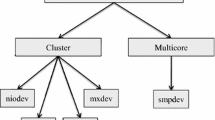Abstract
This paper presents F-MPJ (Fast MPJ), a scalable and efficient Message-Passing in Java (MPJ) communication middleware for parallel computing. The increasing interest in Java as the programming language of the multi-core era demands scalable performance on hybrid architectures (with both shared and distributed memory spaces). However, current Java communication middleware lacks efficient communication support. F-MPJ boosts this situation by: (1) providing efficient non-blocking communication, which allows communication overlapping and thus scalable performance; (2) taking advantage of shared memory systems and high-performance networks through the use of our high-performance Java sockets implementation (named JFS, Java Fast Sockets); (3) avoiding the use of communication buffers; and (4) optimizing MPJ collective primitives. Thus, F-MPJ significantly improves the scalability of current MPJ implementations. A performance evaluation on an InfiniBand multi-core cluster has shown that F-MPJ communication primitives outperform representative MPJ libraries up to 60 times. Furthermore, the use of F-MPJ in communication-intensive MPJ codes has increased their performance up to seven times.
Similar content being viewed by others
References
Baker M, Carpenter B, Fox G, Ko S, Lim S (1999) mpiJava: an object-oriented java: interface to MPI. In: 1st Intl workshop on Java for parallel and distributed computing (IWJPDC’99), San Juan, Puerto Rico, 1999, pp 748–762. http://www.hpjava.org/mpiJava.html (Last visited: December 2008)
Baker M, Carpenter B, Shafi A (2005) A pluggable architecture for high-performance Java messaging. IEEE Distrib Syst Online 6(10):1–4
Baker M, Carpenter B, Shafi A (2008) MPJ Express: towards thread safe Java HPC. In: Proc 8th IEEE intl conf on cluster computing (Cluster’06), Barcelona, Spain, 2006, pp 1–10
Barchet-Estefanel LA, Mounie G (2004) Fast tuning of intra-cluster collective communications. In: Proc 11th European PVM/MPI users’ group meeting (EuroPVM/MPI’04), Budapest, Hungary, 2004, pp 28–35
Bornemann M, van Nieuwpoort RV, Kielmann T (2005) MPJ/Ibis: a flexible and efficient message passing platform for Java. In: Proc 12th European PVM/MPI users’ group meeting (EuroPVM/MPI’05), Sorrento, Italy, 2005, pp 217–224
Bull JM, Smith LA, Westhead MD, Henty DS, Davey RA (2000) A benchmark suite for high performance Java. Concurr Pract Exp 12(6):375–388
Chan E, Heimlich M, Purkayastha A, van de Geijn RA (2007) Collective communication: theory, practice, and experience. Concurr Comput Pract Exp 19(13):1749–1783
Dongarra JJ, Gannon D, Fox G, Kennedy K (2007) The impact of multicore on computational science software. CTWatch Q 3(1):1–10
Finis Terrae Supercomputer (2008) http://www.top500.org/system/9156 (Last visited: December 2008)
Genaud S, Rattanapoka C (2005) A peer-to-peer framework for robust execution of message passing parallel programs. In: Proc 12th European PVM/MPI users’ group meeting (EuroPVM/MPI’05), Sorrento, Italy, 2005, pp 276–284
IBM: Asynchronous IO for Java (2008) http://www.alphaworks.ibm.com/tech/aio4j (Last visited: December 2008)
Kaminsky A (2007) Parallel Java: a unified api for shared memory and cluster parallel programming in 100% Java. In: Proc 9th intl workshop on Java and components for parallelism, distribution and concurrency (IWJPDC’07), Long Beach, CA, 2007, p 196a (8 pages)
Message Passing Interface Forum (2008) http://www.mpi-forum.org (Last visited: December 2008)
Pugh B, Spacco J (2003) MPJava: high-performance message passing in Java using Java.nio. In: Proc 16th intl workshop on languages and compilers for parallel computing (LCPC’03), College Station, TX, 2003, pp 323–339
Taboada GL, Touriño J, Doallo R (2003) Performance analysis of Java message-passing libraries on fast ethernet, myrinet and SCI clusters. In: Proc 5th IEEE intl conf on cluster computing (Cluster’03), Hong Kong, China, 2003, pp 118–126
Taboada GL, Touriño J, Doallo R (2008) Java Fast Sockets: enabling high-speed Java communications on high-performance clusters. Comput Commun 31(17):4049–4059
Thakur R, Rabenseifner R, Gropp W (2005) Optimization of collective communication operations in MPICH. Int J High Perform Comput Appl 19(1):49–66
TOP500 Supercomputing Sites (2008) http://www.top500.org (Last visited: December 2008)
Vadhiyar SS, Fagg GE, Dongarra JJ (2004) Towards an accurate model for collective communications. Int J High Perform Comput Appl 18(1):159–167
van Nieuwpoort RV, Maassen J, Wrzesinska G, Hofman R, Jacobs C, Kielmann T, Bal HE (2005) Ibis: a flexible and efficient Java-based grid programming environment. Concurr Comput Pract Exp 17(7–8):1079–1107
Zhang BY, Yang GW, Zheng WM (2006) Jcluster: an efficient Java parallel environment on a large-scale heterogeneous cluster. Concurr Comput Pract Exp 18(12):1541–1557
Author information
Authors and Affiliations
Corresponding author
Rights and permissions
About this article
Cite this article
Taboada, G.L., Touriño, J. & Doallo, R. F-MPJ: scalable Java message-passing communications on parallel systems. J Supercomput 60, 117–140 (2012). https://doi.org/10.1007/s11227-009-0270-0
Received:
Accepted:
Published:
Issue Date:
DOI: https://doi.org/10.1007/s11227-009-0270-0




